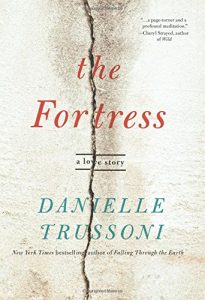The Fortress by Danielle Trussoni
 I’m busily sorting through my stack of advanced readers copies, which, I’m ashamed to say, have been piling up, unread, some for more than a year. Bad Book Barmy, very bad.
I’m busily sorting through my stack of advanced readers copies, which, I’m ashamed to say, have been piling up, unread, some for more than a year. Bad Book Barmy, very bad.
One of my January goals (beyond the annual diet and fitness ones) is to figure out which from the pile I will read and review for you, my loyal readers.
This one, with its lovely cover, ended up coming to bed with me the other night. My little book-reading light (because Husband insists on sleeping) stayed on well past midnight.
At first blush, The Fortress may seem like one of those typical memoirs recounting a romantic adventure of a couple finding, buying and fixing up a rundown French villa ~~ but no, it is so much more. More complicated, deep, and especially, more real.
From the back cover:
From their first meeting, writer Danielle Trussoni is spellbound by a brilliant, mysterious novelist from Bulgaria. The two share a love of music and books and travel, passions that intensify their whirlwind romance. Within months, they are married and embark upon an adventurous life together.
Eight years later, their marriage in trouble, Trussoni and her husband move to the South of France, hoping to save their relationship. They discover Aubais (pronounced obey, as in love, honor and . . . Aubais), a picturesque medieval village in the Languedoc, where they buy a thirteenth-century stone fortress. Aubais is a Mediterranean paradise of sun, sea, and vineyards, but they soon learn the fortress’s secret history of subterranean chambers, Knights Templar, hidden treasure, Nazis, and ghosts. During her years in Aubais, Trussoni’s marriage unravels with terrifying consequences, and she comes to understand that love is never the way we imagine it to be.
In The Fortress, Ms. Trussoni lays bare the consequences of her impulsive life. Her whirlwind romance in Bulgaria and then purchasing a run-down French villa called La Commanderie. Her husband confounds her with lies and he manipulates Ms. Trussoni into doubting her own sanity. But she hangs on to her rose-colored perception of their love. She refuses to give up, continuing to try and help the often cruel and increasingly psychotic Nikolai — trying to fix what is, in reality, a collapsing marriage.
The writing is starkly beautiful and Ms. Trussoni strikes a wonderful balance between both the dark and the beautiful sides of their love, their messy and often glamorous life, and what was versus what is.
We were both extraordinary and wrecked, naive and experienced, brilliant and stupid, our exceptional parts snapping together as seamlessly as the damaged ones.
And this heartbreaking passage when Ms. Trussoni’s mother unearths her hope chest and explains, this was what most young girls born in the 40’s or 50’s did to prepare and dream about their future marriage.
It wasn’t until later that I understood that I did in fact have a hope chest of my own. Not of wood, not locked up and hidden under a stack of quilts, but a hope chest nonetheless, one filled with dreams about my life. I believed in romance and destiny. I believed in love at first sight. I believed that when I found the right person, time would stop and we would be suspended in a state of endless passion. There was no place in my hope chest for disappointment or failure. There was no place for imperfection or broken promises or compromise. And while my hope chest ideas might have had all the trappings of a good romance, they didn’t have the capacity to hold real love.
I gobbled this book, reading it in great gulps — perhaps everything could work out, maybe some sort of redemption for them both. But The Fortress is a stingily true tale of life — real, messy and rough around the edges. Finally, there are legal battles, children’s welfare at stake, anger, tears and a resolution (of sorts).
Rest assured, despite everything, Ms. Trussoni makes it through. And in the end, this is a love story. You’ll have to read The Fortress yourself to discover the happy ending.
An advanced readers copy was provided by Dey Street Books, an imprint of William Morrow.






Thank you, Barmy for letting me know there is a happy ending, of sorts, to this book. I have read enough tragedies in my long life, and lived a few of them as well. Now I prefer to make the journey through the pages of a book with the firm hope that the end will be somewhat uplifting. Hope is rather empowering….dashed hope,…not so much.